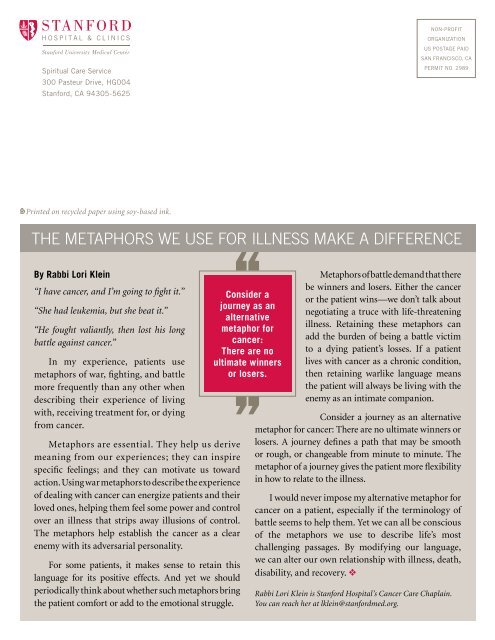SPIRITUAL CARE NOTES - Stanford Hospital & Clinics
SPIRITUAL CARE NOTES - Stanford Hospital & Clinics
SPIRITUAL CARE NOTES - Stanford Hospital & Clinics
Create successful ePaper yourself
Turn your PDF publications into a flip-book with our unique Google optimized e-Paper software.
Spiritual Care Service<br />
300 Pasteur Drive, HG004<br />
<strong>Stanford</strong>, CA 94305-5625<br />
Printed on recycled paper using soy-based ink.<br />
By Rabbi Lori Klein<br />
“I have cancer, and I’m going to fight it.”<br />
“She had leukemia, but she beat it.”<br />
“He fought valiantly, then lost his long<br />
battle against cancer.”<br />
In my experience, patients use<br />
metaphors of war, fighting, and battle<br />
more frequently than any other when<br />
describing their experience of living<br />
with, receiving treatment for, or dying<br />
from cancer.<br />
Metaphors are essential. They help us derive<br />
meaning from our experiences; they can inspire<br />
specific feelings; and they can motivate us toward<br />
action. Using war metaphors to describe the experience<br />
of dealing with cancer can energize patients and their<br />
loved ones, helping them feel some power and control<br />
over an illness that strips away illusions of control.<br />
The metaphors help establish the cancer as a clear<br />
enemy with its adversarial personality.<br />
For some patients, it makes sense to retain this<br />
language for its positive effects. And yet we should<br />
periodically think about whether such metaphors bring<br />
the patient comfort or add to the emotional struggle.<br />
NON-PROFIT<br />
ORGANIzATION<br />
US POSTAGE PAID<br />
SAN FRANCISCO, CA<br />
PERMIT NO. 2989<br />
THE mETAPHORS WE USE FOR ILLNESS mAkE A DIFFERENCE<br />
Consider a<br />
journey as an<br />
alternative<br />
metaphor for<br />
cancer:<br />
There are no<br />
ultimate winners<br />
or losers.<br />
Metaphors of battle demand that there<br />
be winners and losers. Either the cancer<br />
or the patient wins—we don’t talk about<br />
negotiating a truce with life-threatening<br />
illness. Retaining these metaphors can<br />
add the burden of being a battle victim<br />
to a dying patient’s losses. If a patient<br />
lives with cancer as a chronic condition,<br />
then retaining warlike language means<br />
the patient will always be living with the<br />
enemy as an intimate companion.<br />
Consider a journey as an alternative<br />
metaphor for cancer: There are no ultimate winners or<br />
losers. A journey defines a path that may be smooth<br />
or rough, or changeable from minute to minute. The<br />
metaphor of a journey gives the patient more flexibility<br />
in how to relate to the illness.<br />
I would never impose my alternative metaphor for<br />
cancer on a patient, especially if the terminology of<br />
battle seems to help them. Yet we can all be conscious<br />
of the metaphors we use to describe life’s most<br />
challenging passages. By modifying our language,<br />
we can alter our own relationship with illness, death,<br />
disability, and recovery. v<br />
Rabbi Lori Klein is <strong>Stanford</strong> <strong>Hospital</strong>’s Cancer Care Chaplain.<br />
You can reach her at lklein@stanfordmed.org.

















